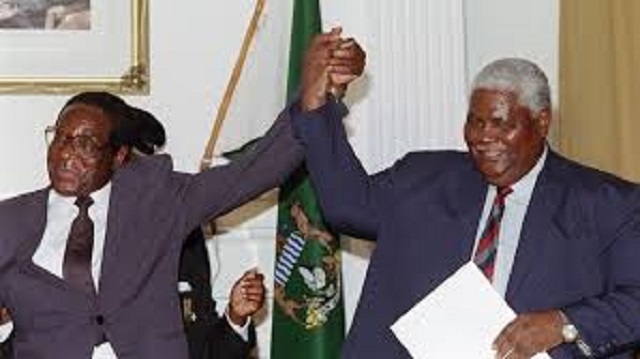EDITORIAL COMMENT: Let’s uphold the spirit of the Unity Accord


President Mugabe and the late Vice President Dr Joshua Mqabuko Nkomo after the signing of the Unity Accord
Yesterday marked the 30th anniversary of the signing of the Unity Accord, an important agreement that put an end to the civil disturbances that were happening in Matabeleland and Midlands regions.
The pact was signed in Harare on December 22, 1987. Former Zanu-PF President and First Secretary and State President, Cde Robert Mugabe signed on behalf of his party while Dr Joshua Nkomo, the leader of PF Zapu signed on behalf of his party.
By appending their signatures to the document, the two leaders did not just bring their two parties together. They actually brought the country together as one since they were the biggest political parties in the country.
We hail both leaders for subordinating their personal interests for the good of their country.
The histories of many countries in Africa are littered with episodes that were like ours prior to 1987 that have resulted in the loss of millions of lives, injuries and damage to infrastructure and economies. Some countries remain unstable and have not recovered from disturbances of similar nature. Ours could have gone the same way given the fact that we had a confrontation between two former liberation movements taking place just three years after a protracted armed liberation struggle. At that juncture, the spirit of war was still in the ex-combatants and the physical ability was still there. However, Cdes Mugabe and Nkomo and their parties of liberation sat down, without foreign assistance whatsoever, and decided to end the disturbances.
As a result of that, the country has enjoyed peace since then and the future looks very bright.
In a message to mark Unity Day, Zanu-PF national spokesperson Ambassador Simon Khaya Moyo said the Unity Accord has ensured that there is peace in the country which should be safeguarded.
“When we attained independence in 1980, the two parties formed a Unity Government. It became desirable that the two parties engage in extensive and intensive negotiations to form one party. These exchanges resulted in the signing of the Unity Accord of 22 December 1987 by the then two principals leading to the formation of the united Zanu-PF.
“In fact this agreement formed the basis of unity for our people across the country and must be defended at all costs. Efforts to derail it must be discouraged. The letter and spirit of the Accord must be respected,” he said.
The 30th anniversary of the signing of the Unity Accord came shortly after developments in the ruling party and the Government threatened peace and unity in the country.
A power-hungry cabal, G40, had emerged in the party, and was trying to supplant the values and ethos of the revolution to install a new, value-free culture. The group had surrounded an icon of that revolution, Cde Mugabe, using his wife, Grace in a bid to overthrow the revolutionary culture that forms the basis of our nation.
For about two years, the cabal had gone on a spree to fire all Zanu-PF members with a liberation history and replacing them with pliant persons, some of whom were, a few years ago, sworn enemies of the party and the revolution.
However, their sacking of Cde Mnangagwa, then Vice-President on November 6, infuriated not just war veterans in our country but also the Zimbabwe Defence Forces (ZDF) and the generality of Zimbabweans who still uphold their history.
The shenanigans of the G40 group represented a clear threat to national peace and unity that the Unity Accord ushered into the country in 1987.
To ensure that the national peace and unity were preserved, the ZDF stepped in to account for the counter-revolutionary elements that had encircled Cde Mugabe. Now the party that brought about Independence in 1980 and lasting peace and unity in 1987 has been recovered, and we have a new government under President Emmerson Mnangagwa.
The national and party unity that has returned will go a long way in facilitating the harnessing of energy towards economic recovery. No economy can grow if its leaders are always fighting as was happening before 1987.
The fighting in Zanu-PF that was happening in recent months was beginning to negatively affect the smooth running of the economy as all attention was concentrated on seeking and retaining power.
We are hopeful that the new political dispensation reunites the people, not only in the ruling party, but also nationally. This will enable the people and their government to work with a singleness of the mind to recover and grow our economy.
That is what the Unity Accord is all about – national unity, peace and development.











Comments